#like yeah there's a lot of cosmetic stuff that's behind a paywall but that's the same as what I remember
Explore tagged Tumblr posts
Text
I regret nothing. this game is still very fun
#like yeah there's a lot of cosmetic stuff that's behind a paywall but that's the same as what I remember#and the games are a little juvenile but if you get past the first few levels it does get to a reasonably engaging level#i still love the eat 'em up game (that's like the big fish in a small pond style where you eat the little fish and slowly get bigger)#i don't see myself as any sort of die hard animal jam player or anything like that lol but it is good for a lil serotonin boost
7 notes
·
View notes
Text
I hate micro transactions and permanently limited content I hate micro transactions and permanently limited content I HATE MICRO TRANSACTIONS AND PERMANENTLY LIMITED CONTENT

#I started playing sky children of light and it’s so cute but they’re whole cosmetic acquiring system is so fucking stupid it angers me#yeah limit a GOOD chunk of your content behind a limited paywall that if you don’t pay and participate in the time frame it’s gone forever#and no one will ever EVER see it again haha sorry if you didn’t know this game existed when it was available it’s too late now#like some of it comes back and I get a bp function but like man#I had no idea this game existed till recently or the fact it had so much stuff in it#only to find out anything mildly interesting is from a season released on the first year#the game is like 5-6 years old now? something like that#and even though some content comes back occasionally there’s so much content at this point it will take forever for things to rotate through#and it’s only SOME not everything from that season pass#like holiday events being gone till next year? sure yeah I get it they want my money it’s okay#but basic content feeling like there’s a one in a million chance you’ll lay eyes on it ever again? that’s crazy#on top of the fact it’s so hard to find out where most content comes from??? and finding a coherent source that’s not a disc I’d never#guess existed unless my sister told me?#DEVS FIX YOUR GAME#only think keeping me playing and grinding is so I can max stuff out as much as I can so I get snag that jellyfish fit when it comes back#I’m also just so so so sick of every game I enjoy wanting all of my money for the simplest things#what happened to releasing a full game where cosmetics and fun extras were a grindy process that felt rewarding#I’d take buying dlc/expansions over dumb cosmetic micro transactions ANY day#okay coming back to add the fact that though there are basic cosmetics you can grind for without real money it doesn’t look that cool#it’s mostly just recolors of the basic cape and plain white outfits#aka do you#like pants or shorts or bell bottoms or leggings#aka a lot of the basic free cosmetics you grind for are boring af
2 notes
·
View notes
Text














So I've been trying out the new Star Wars Hunters game that came out on Mobile & Switch recently!
I haven't played many brawling type games like this so I wasn't expecting much, but I've actually been really enjoying it so far! I've probably put too many hours into playing (especially since I was super sick around launch and didn't have much else I could do), and I hit max level 50 and Kyber in ranked a while ago... (yeah, playing too much, I know...)
Thought I'd share my initial thoughts though, since I've put in the time!
Note: Some folks have apparently been playing the beta version for a while, but I've only started playing since the public release.
Stuff I like about it so far:
-The really creative and fun SW universe characters is the best part. A blind Miraluka sniper? (Diago) An Ugnaught driving a Droideka? (Slingshot) Literally two Jawas in a trench coat??? (Utooni) They're fun and have great personality, you can read their blurbs here. I like how they're all voiced and also all have their own theme songs (which are honestly heckin catchy)!
-Controls are very intuitive. Again, I am not much of a gamer and have very little experience with these kinds of games, but I picked it up quick. I play on my iPhone and it's great.
-The graphics are GORGEOUS. It looks beautiful, everything moves stunningly smoothly. Honestly it's hard to believe this is a ftp game.
-So far it's very much ftp friendly! Most of the money locked stuff are just cosmetics, and even then there are tons of free ones. One of the characters, Aran Tal, is currently behind a not-too-expensive paywall, but he'll apparently be available for free soon as well.
-The skins for the characters are fun and creative! Imara Vex has one that looks like Durge, and Zaina has one that kinda gives me adult Omega vibes. The store has an active rotation of skins that you can buy with either irl money or in game currency, and apparently old event skins eventually end up in the circulation too. Here are just a couple of my favorites:

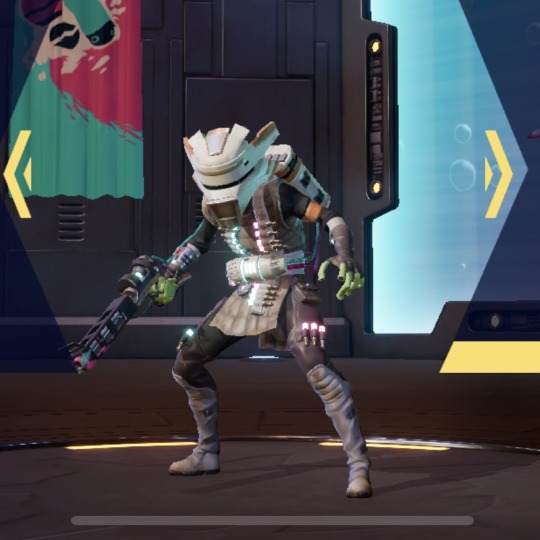
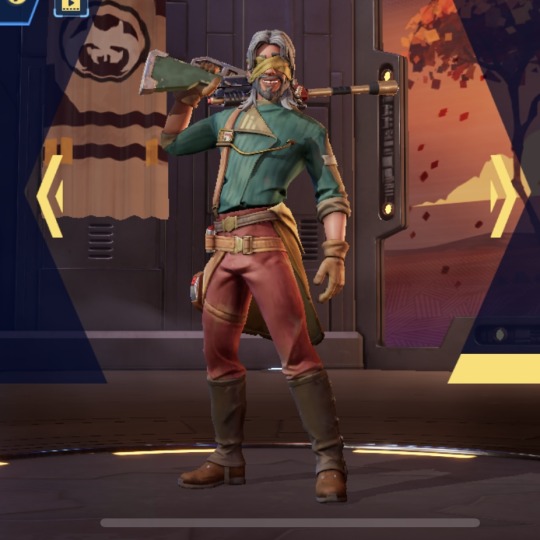
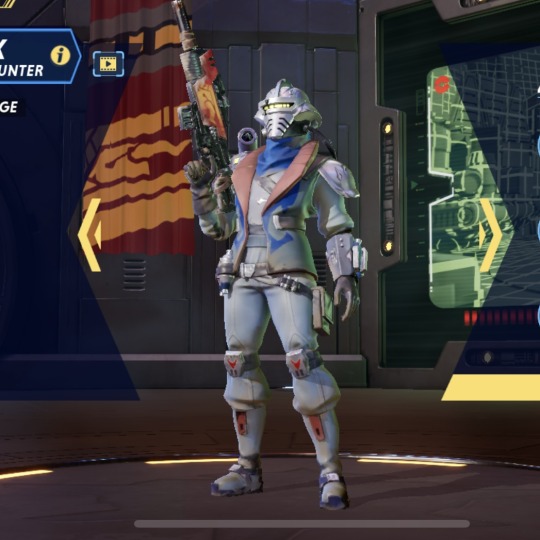
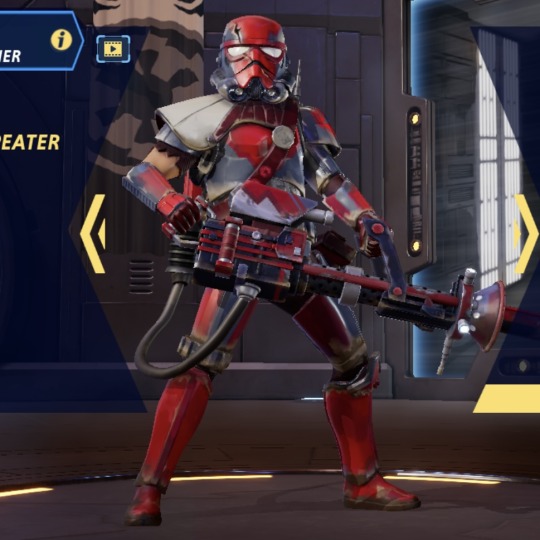
-I love the locations! Each one is very Star Wars vibes and has lots of cool lil in-universe elements, like pod racers going through Mos Espa (they can run you over). The time period is New Republic era, so everything is relatively plausible for that time period in universe.
-There's a bunch of different game types, so you don't get bored, and they each have different challenges, and different characters who shine in them. It's unfortunately a bit addicting.
-The events aren't too grindy or tedious (so far).
-I really appreciate the different modes you can play on! The main two modes are casual and ranked, so it's possible to play low stakes and just level up your characters in casual, or try to challenge yourself more in ranked. I appreciate how the limited time events that sometimes throw you into random characters you might not be experienced with are never ranked, so it's okay to suck. Character leveling is the same in both casual and ranked. And I appreciate the Training mode too, where you can try out all of the characters so you're never in a "wtf does this do" in a PVP environment. I get so anxious during PVP if I don't know what I'm doing.
Stuff I hope they improve on:
-Playing with people + party invites are kind of a pain. The invites disappear really quickly, so it's really hard to time it so you can actually play with your friends. It's also hard to know whether the party is going to be playing ranked or casual, and if ranked you can't see the ranks of the folks in your party before agreeing to join, which is a little nerve wracking.
-This is less a complaint, and more just general frustration, but ranking up is pretty tedious near the top, which is to be expected I suppose. Through Aurodium, it was generous because you earn so many more points when you win than when you lose, but in Kyber, you win/lose the same amount. You are judged by your team score, so losses bring down everyone's rank, and it feels like you have to take three steps back for every one. Kyber players are comparatively more competent, but I've been in some...unfortunate matchups before. (As of writing this, I'm in Kyber III, but I've been bouncing between Beskar II~Kyber II for the past two weeks...will I ever make it to Kyber I cries)
-I think they started with a decent batch of characters, and I know this game just came out of beta and the team said they'll be expanding on them! So this isn't really a complaint either. But in the future, I hope they add more female characters (currently only 4 female characters out of 13 total, which feels a little skewed), as well as more support characters, who always feel lacking.
I'd love a few more "popular" iconic Star Wars species to have characters in support. Maybe a Togruta apothecary? A Nautolan water medic? A Pantoran doctor? And personally, I'd love a super buff Twi'lek lady as a tank! Either way, lots of possibilities to look forward to, especially given how much I love the characters so far!
So far, I've been playing on my iPhone and it works pretty smoothly, though I've heard of some Switch users having trouble with lagging/connecting. I think I've only been booted out once, and even when I'm forced to pop out of the app for a moment (last night, I got an Amber alert that paused my screen), I was able to continue playing with barely any pause, which is honesty impressive. I've heard controls are easier on Switch, but I think I've been doing okay on mobile.
Have you tried this game out??
Here's the launch trailer if you're interested, it's Pretty:
youtube
And a self plug!

Feel free to add me, I'm Akaz!
I main Skora (Rodian support) and prefer to play her in ranked, but also have Aran Tal (Mando, he's my baby boi), Sentinel (Stormtrooper tank), and Diago (Miraluka sniper) also at max level. Working on leveling up the others in casual mode!
I'm very happy to play casual mode with anyone! (and I play casual mode a lot to level up my less-used characters, and recommend spending some time there for new folks before diving into ranked)
I'm also happy to play ranked!
(but be warned, you'll kinda want to know what you're doing, or they will slaughter you in Kyber)
I might type up a follow up review giving my thoughts on each individual character and maybe some general tips idk
70 notes
·
View notes
Text
Organisation and task planning apps I find useful as an ADHDer
People often wonder how I'm so organised. The truth is, it's necessity and coping mechanism. This post is a recommendation of a few tools to help you all to improve your time management, so long as you can find just a little self will.
Apps will be listed first, and I'm closing this post with a longer explanation to try and sell you on the benefits and ease of doing this. I tried my best to include a variety for different preferences:
Remember the Milk
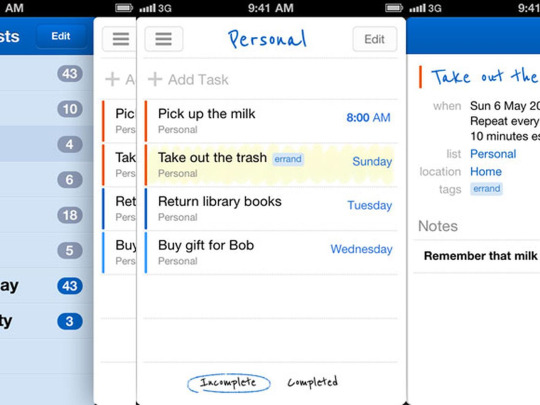
Available as a website and as an app
Good for people who like looking at lists
You create 'lists' (category of task such as home, school etc.), which you can also add tags and locations to
All of your lists combine into daily and weekly checklists
Imports to google calendar in the free version
Unfortunately a lot of options are paywalled, including app notifications. If you have an android, you can work around this with your normal phone calendar.
Trello

Good for more visual based people
Mostly a website, but available as an app
Better for long term tasks and projects
Would recommend for people more used to organisation as it can take a while to set up. However if you dedicate some time, you can get some great custom options.
A lot of functionality in the free version.
Habatica
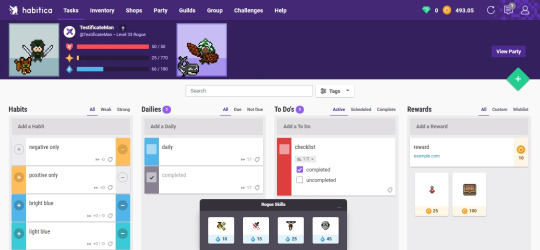
Probably my favourite
Has a web and app version - where the app is actually quite easy to look at!
It is basically just a gameified version of your daily schedule. You get rewarded for checking off your tasks with RPG points, and you can buy items with coins and stuff.
Gives you a whole sense of progression and is great for dopamine.
A feature I love is the ability to set task difficulty, which gives you higher reward for harder tasks.
More of a daily habits type of thing, and not so great for one-off events.
All the functionality is free, the subscription is mostly cosmetic stuff.
Do it Now RPG
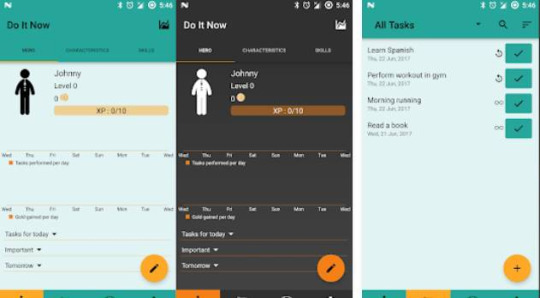
Similar in concept to habatica
What I really like specific to this app is the ability to assign tasks to specific character values. That means your character progression is actually quite realistic
Has an actual calendar which is a plus, however it is locked behind paywall. However it's about £11 for a whole year, so it's one of the cheaper options
Time Planner: Schedule and Tasks

Allows you to view tasks in these cool bubbles
You can also view them in list view and calendar view
Lots of customisation and easy to make categories
Most of the functionality is present in the free version including push notifications
Cute colour scheme!
Has a really good tutorial, which is kind of unique to these apps (which can be overwhelming)
Sectograph
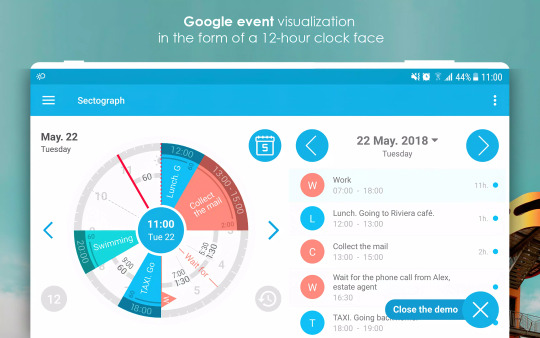
Basically lays out your tasks visually on a clockface
Works best in combination with your existing calendar app
Has a home screen widget!!! You can have this be the thing you see whenever you unlock your phone!!!
Some features such as colour customisation locked behind the paywall, but it's a life time purchase of like £4 so it might be worth it.
Sweepy

A cleaning app specifically but I find it useful enough to mention here.
One thing I like is that it comes with existing task lists (editable). All you have to do is add the rooms in your house.
Basically requires very little set up and reminds you to clean at good intervals.
Benefits of doing this!
So immediately, you might think that this is super daunting. And no yeah, it is and I'm not perfect with these apps at all. But the thing is, with executive dysfunction being so crippling a lot of the time, any tool that helps is so valuable.
I find that writing down what I have to do not only makes it easer to remember, but also gives me more internal pressure to actually do it.
ADHDers generally enjoy problem solving and tasks that involve min/maxing. Just try and think about it like that during the set up stage. The set up is by far the hardest part. Good life advice in general honestly: gameify everything.
If none of these appeal to you, you can still do a lot on your phone's calendar app. Actually, back when I was doing my school exams, I made study schedules on excel spreadsheet that worked pretty well. There are so many options out there!
#adhd#neurodivergent#neurodiversity#actually adhd#task planning#organisation#adhd hacks#executive dysfunction
69 notes
·
View notes
Note
have you stopped playing the game?
short answer: yeah, for the time being. i played through all class stories multiple times, i played through the expansions (though i stopped playing the newest one from february 5 mins after starting it bc it quite frankly bored me to death) and im pretty much done with it. maybe i'll return in a few years and pick up some stories again but the game doesn't keep me entertained whatsoever. (HOWEVER this does not mean this blog is abandoned, i love my characters very much and still develop and tinker on them, but my artistic muse lies somewhere else rn)
long answer:
ultimately, i have to say swtor is severely lacking some casual map events, that cycle through the day to get some casual player engagement. basically like the monthly ones (gree, rakghoul) but on a minor scale and daily, on every single planet. and i dont mean missions you pick up from a missions terminal that you can solo, i mean things that happen casually where people randomly decide to join in in the spur of the moment - akin to world bosses perhaps?
i feel like its pretty sad that the only 'multiplayer' the game has to offer are flashpoints and operations (the latter hidden behind a paywall), where gear really matters if you wanna play it with some randos, which puts off a lot of casual players (ESPECIALLY with these newest gear changes. LMFAO). and lets be real, 99% of solo players do heroics on their own unless they happen to find someone by chance to team up with so it gets done faster. and they're pretty static so its not really an event either but just a chore to get money (for a market thats so ridiculously out of hand that you might as well just forget buying desireable cosmetics while you're at it)
playing gw2 as my main mmo rn and i find myself actively searching and engaging a lot of map boss events and stuff even without a guild, and its never been an issue of what gear i have or if im good at my rotation or whatever. everyone can jump in and help out, reap the rewards and then everyone parts ways again. and if someone does die, u just band together and revive them. and if the event fails? its whatever because it'll repeat in a few hours anyway so we can try again. eso and xiv have them too and i used to camp at certain event spots all day just to play some silly event and get loot and horse around with random players. these are the moments i cherish in mmos.
u might argue swtor just isn't a game like that but 🤷♂️ the game quite frankly bores me so much, it feels very static and undynamic, i usually drop it again after a week of playing. besides story there isnt much to do from a casual perspective, and the rewards for doing fp/ops are... mediocre at best. i dont even have any motivation to do them unlike in XIV, ESO or GW2 where u actually get really cool gear or items of all kinds that you can use for ur enjoyment. and even with those monthly events like the rakghoul ones, it feels more like a competition of who can do the mission faster so they dont have to wait for an object to respawn rather than 'lets do it together and all win' !
so tl;dr : swtor could use some daily active map events where all kinds of players can engage in, with desirable rewards such as cool looking gear, titles, minions, mounts, furniture, whatever, and same goes to flashpoints and operations. and then i'll maybe return long term.
#hennyway. my two cents and feelings that have accumulated over the months#askbox#anonymous#i'll always draw zabrak and mirialan tiddies on this blog anon dont u worry
17 notes
·
View notes
Text

@hundredslept has sent: 🔥
Send me a “ 🔥 “ for an unpopular opinion. [Accepting, seind in a subject!]

// Pokemon masters isn’t as much of a cash grab, as people like make it out to be. People who usually complain about this, either are very bad at managing the resources given away by the game or just don’t know how to use the game’s features to speed things up in the grinding process.
I have almost no experience with gacha games, so I can’t compare it to others of this kind. However, I’ve heard from others how there are far worse gacha games out there. Also let me remind you all how, there’s nothing in life that’s truly free, much less in the ‘free’ mobile app games market. IMO, Dena handled this very well, by only giving those who paid for them gems the chance to get a better chance to pull the rarer characters or pick one of your liking.
They aren’t halting your progress in game with a paywall, which is a pretty common tactic in mobile games & most games that call themselves ‘free to play’. As someone who used to play League of Le.gends, this is something I’ve always found neat in it, you gain an in-game currency by playing the matches so you can spend it on the essential stuff, leaving only the cosmetic things behind the paywall.
I’ve been playing the game since October - November, and I never even once felt the need to spend money on it. Do I have all the characters? No, but what I do have are some pretty great and cool ones, and they can take on most challenges thrown at our way.
I’m not saying that the game is perfect, or that it is a breakthrough in mobile games. But honestly? I feel like the game truly deserves all the 5 stars reviews, they are receiving in the app store.
Masters could have truly become nothing more than a cash grab, littered with micro-transactions, and paywalls everywhere you looked at. But they didn’t, they made a game that keeps reqarding you for coming back to it, and doesn’t require much from your time.
So yeah, Masters deserve some love. Bc honestly, Dena is treating pokemon a whole lot better than GF is.
4 notes
·
View notes
Text
Destiny 2: Curse of the Butthurt Man-Children Review

Destiny 2 has been in trouble for awhile now and despite what the crying man-children on Reddit, Twitter, Facebook, the Bungie forums and the hack of journalists from Kotaku, Forbes (lol did I really include them?), IGN, and Polygon, I strongly believe Destiny 2 is getting better in some aspects and worse in others. I still believe this game have great potential in the future, but for Destiny 2 to be great, Bungie needs to be less reactive and beat the community to the punch, sort of speak. More on that a little later. Let’s get on to my blasphemous opinions.
The Story

The Curse of Osiris story reminds me of Call of Duty: Black Ops III’s story. Let me explain before you get triggered: The Call of Duty, in my opinion, always had a great story despite how you felt about the multiplayer and it’s community. When I played Black Ops III’s campaign, I couldn’t help but to be lost in the plot and be almost put to sleep. The plot was convoluted and had too much filler content that further added to my confusion. This is exactly how I felt playing Curse of Osiris’s story. Although people think the story was pretty fast, I beg to differ. It took me about 4 hours to complete, excluding getting distracted by Public Events and in real life stuff. Then again, I wasn’t speed-running. Maybe that’s why, but it was definitely longer than the Dark Below which a lot of people forget about. Bungie squandered a perfect opportunity to effectively use the Osiris lore.
At the same token, Bungie opened the door to expanding the Osiris lore (besides a webcomic) and revealing some Saint-14 lore. I would also love some Dredgen Yor lore at some point too. Time well tell how much more lore we’ll get and of whom.
Eververse
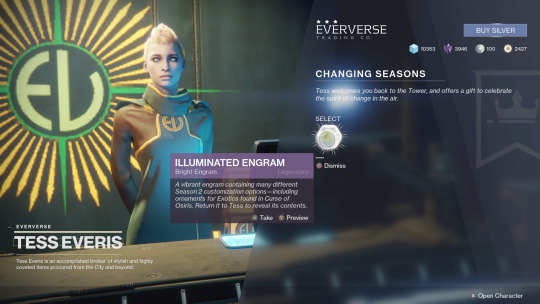
Dear Lord... I hate the fact that the loot pool is so large and RNG is still what you expect from a Destiny game. If I had to pick which is worse between Treasures of Ages and Illuminated Engrams, I wouldn’t answer because there is no lesser of the two evils. Although, at least I get the armor in Destiny 2 while I still haven’t get a single piece of AoT armor for any character on Destiny 1... on Xbox and PS4.
At the end of the day, her wares are still optional, cosmetic to a certain extent, and not game breaking. That’s all I truly ask for in microtransacions. You can make the argument that the Ghost Shells increase xp gains, points out nearby chests and all that jazz. Then, I’ll rebuttal by calling you a retard and ask a simple question: “How does differ from other Ghost Shells and how does it give you an unfair advantage in the Crucible?” Basically, the only people who still hates Eververse are unlucky like me, poor/cheap people and conspiracy theorists that think Bungie is intentionally making her stuff look better than the non-microtransaction gear. Stop being poor. Taste is subjective.
Mercury
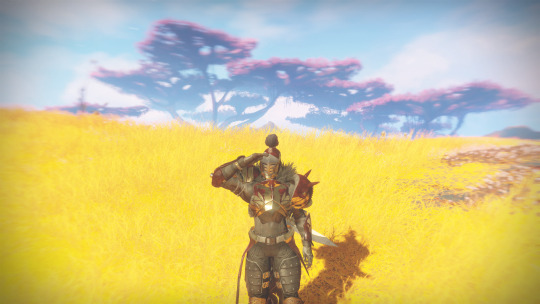
It’s a very small area that I would’ve forgiven if you could freely explore the Infinite Forest, Past Mercury, and Dark Future Mercury. However, you can’t. You can only replay the story missions and adventures to go to those places. Not to mention there’s only one Lost Sector. There’s enough space for at least three. Mercury was over-hyped. The Infinite Forest was filler. More could’ve been done.
Despite that, the visuals are beautiful as always. Past Mercury gives you a sense of peace and serenity while Dark Future Mercury makes the atmosphere more grim and dire. Also, doing Flashpoints on Mercury doesn’t require to actually do a single Public Event. You just have to kill majors that are running around the map.
The Leviathan Raid Lair
I have not played it yet, but I heard great things about it. It’s a shame that Bungie advertised it as just a shorter version of the current raid with different bosses and mechanics because I had low expectations and now I think I might be in for a great time.
I’ll update more when I can finally play it.
#TwoTokensAndABlue: Public Events were Nerfed
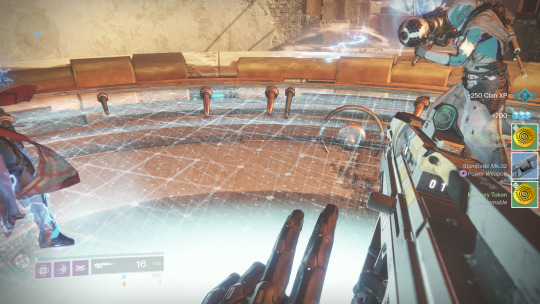
So much with being rewarding. Less xp gains, lower probability getting exotics, and quite frankly more of a reason not drop everything to go do one.
The Current State of Crucible
Crucible is still like listening to music on Spotify without premium: You gotta play until you get the gametype you want or keep backing out until you get the match you want. There are also no signs of old Destiny 1 game modes returning and the current ones being separated.
At least, we get to tell future Kinderguardians that for a weekend, the Destiny Community was able to play a large game of laser tag and then there’s the return of Mayhem Clash. MC is the only thing making PvP worth play to me.
Armor Ornaments

I’mma just say it: Most of the ornaments makes the armor look ugly and/or are uninspired. Above all, I’m extremely disappointed with Future War Cult’s. All it does is change the color scheme to white and blue. That’s it.
I do like the fact that you can unlock ornaments account wide. For example, unlocking the Crucible Titan Mark ornament unlocks the Crucible Hunter Cloak and Warlock Bond even if you never played on the other characters.
“Heroic” Strikes
Oh boy... Where do I begin? I was very excited about this. A good percentage of my Destiny 1 playtime was shutting my brain off after a long day and running Heroic Strikes if I liked the modifiers. Destiny 2 said, “Why don’t I just take Vanguard Strikes, raise the power level and call it Heroic Strikes? That’s it!” Bungie did say that they will add modifiers, but two things: 1) Why didn’t you just wait? If it’s incomplete why release it now when you could do so later complete? 2) I hope the modifiers aren’t the Destiny 2 Nightfall modifiers. Please God no.
The Vault System is Still a Mess
Imagine every single file on your computer was on your desktop. No folders. Just right there in front of your face. On top of all that, you can only have 200 of those files on your computer before you have to start deleting stuff. That’s where we’re still at. Not to mention you can hold up to 50 different shaders on your person, yet Bungie decides to make more than 50 unique shaders. It gets better: Duplicate Dawning shaders will sort into separate stacks depending on where they were received from. Dawning shaders received through Eververse will fall into one stack, and shaders earned through activity rewards will be sorted into another. This is not a bug and was intentional. On top of all this: no increased vault space, shader kiosk, or mass deletion option.
Prestige Mode Locked by CoO-Paywall
It seems like the less you invest in Destiny 2 (monetary-wise and in playtime), the more your opinion matters somehow in comparison to actual dedicated fans of the game. The whole issue was that people who didn’t owe the DLC, can’t play the 330 version of the Nightfall & Leviathan Raid due to vanilla players not being able to reach the new level cap. Trials of the Nine was also blocked. Note: Normal Mode was bumped up for both the Nightfall and Raid so you can still reach 305 playing those. Trials ALWAYS required people to have the latest DLC and patches. Hell, Nightfalls got the same treatment in Destiny 1, and mind you, there was only one difficulty. The only people that were angry were the disgruntled Destiny 2 players who stopped playing a long time ago and/or already owns the DLC. Trust me, if you’re a hardcore fan of Destiny or remotely likes it, you would’ve made arrangements to get the DLC. Don’t come at me with that “I love the game, but have no money” bullshit. This was all a case of “What if my friend buys Destiny 2 and I can’t play with him/her?!” Um... tell them to buy the game used/on sale and the DLC? Maybe you could buy it for them so you can play with them? Gee, this is a difficult situation I’ve never been in.
Trust me, no one who hasn’t bought Destiny 2 at this point won’t buy it because of all of the ruckus this community is making. Due to Bungie getting cuck’d by a bunch of poor people who don’t even play their game anymore that complained about a theoretical situation, the first Faction Rally of Season 2 was postponed to I assume (I hope) at the beginning of 2018.
Quality of Life Updates Frequency
I remember a time Bungie was constantly adjusting things like the economy and user interface on top of tuning weapons and subclasses, squashing bugs and things of that nature. Destiny 2 received its first Quality of Life update in December on the day of this DLC’s release. Yeah, Bungie fixed stuff here and there between vanilla Destiny 2 and Curse of Osiris releases, but there was the over abundance of legendary shards some people had to deal with, shitty RNG not giving people what they want, etc. that was just improved. The difference between patches and QoL updates to me is one fix problems and the other improves on what was working fine but can be frustrating. There is less of the latter.
The State of the Destiny Community
Everything that I’ve stated thus far is forgivable. However, Destiny 2′s state of being the target of hit pieces of gaming media and butthurt “fan” backlash is 10% Bungie being reactive, 10% Bungie making dumbass decisions, 80% self-proclaimed fans having buyer’s remorse. Destiny 1 was considered an abomination of game around this time last year for whatever dumb reason people came up with. Destiny 1 was shitted on repeatedly. Now all of a sudden, people love and miss Destiny 1 so much. It was the community’s constant bitching that made Destiny 2 the way it is. Bungie had to find a way to not repeat Destiny 1, but guess what... people flipped flopped. Ask any Destiny fan how they felt about Destiny 1, I guarantee all will praise it, but half of them were singing a different tune last year. Destiny 2 and Curse of Osiris is the community’s fault. Bungie had some part in the blame, but: 1) Me and every other non-Bungie employee don’t know what’s going on behind closed doors at the studio in Redmond, WA. 2) If anything, blame the leadership at Bungie. Why are you getting mad some artist or sound engineer. They don’t program the game or have authority to do whatever they want to the final product if it’s outside of their department.
We are the point where people constantly complaining about bullshit like optional microtransactions and plays other games are considered “concerned fans.” Meanwhile, people like me who are objective, still actively plays the game despite it’s current state, and can compliment game when something is done right gets accused of being on Bungie’s payroll. The toxicity of this community reached heights I never thought possible and it makes me cringe to be an actual fan sometimes. Not to say I’m an angel, which I’m not, but at least I provide constructive criticism to Bungie and lash out at little Jimmy who claims to hate the game so much. I’m against people who insist upon passing on their misery onto other people who are actually enjoying the game. I’ve looked on GameStop’s app and Destiny 2 is worth between $12-18. I can recommend better games for that price. If you have Destiny 2 on disc and are that dissatisfied with it, I challenge you to sell it. If you have it digitally, I’m sure you can get a full refund somehow. I challenge you to get that refund. A reasonable adult, tries to get their money back and move on. If you don’t at least try, you’re full shit.
Bungie’s only unforgivable sin is giving birth to a community of entitled ingrates.
Final Verdict: 7.75/10
This could’ve been better and it could get better in 2018. However, out of the gate... it does not live up to the hype.
#destiny#destiny 2#destiny the game#destiny 2: curse of osiris#curse of osiris#review#bungie#activision#fanboy alert#mercury#eververse#leviathan#raid
6 notes
·
View notes
Text
Can Your DNA Tell You the Healthiest Way to Live Your Life?
A double helix begins to swirl on my screen after I upload the raw data from my 23andMe genetic test to a site called DNA Lifestyle Coach. An ethnically ambiguous illustrated girl greets me, gleefully eating a bowl of vegetables while holding her cell phone. Against a salmon-colored backdrop are the words: “MY DIET COACH,” offering a health plan “tailored” to my genetics.
Here is what the DNA Lifestyle Coach, run by a company called Titanovo, promises: For between $215 and $320, it will send you a saliva kit and analyze your genes to determine how you should best live your life for optimal mental and physical health, as well as optimal dental and skin care. For another $150 it will measure the length of your telomeres (the protective caps on the ends of our chromosomes, which typically shrink as we get older and are being studied to understand aging), to help you assess your longevity. You can also bypass Titanovo’s DNA test and instead merge data you’ve already received from 23andMe (as I did) or another testing company.
DNA Lifestyle Coach is one in a batch of companies that has emerged in recent years, promising to pare down confusing personal DNA data reports, using science, leaving you instead with a simple set of bullet points for how to live healthier, happier, stronger, smarter, longer.
There’s DNAFit. And Kinetic Diagnostics. And even a “genetic superhero test” by Orig3n, which makes DNA-based predictions about your strength, intelligence, and speed. Most of these are aimed at boosting athletic and physical performance and preventing sports-related injuries. But DNA Lifestyle Coach ventures into cosmetic and stress-reduction advice, seeking to answer questions like: What can our genes tell us about how we can sleep better? What secrets does my DNA hold about preventing aging?
As I begin to read my report, DNA Lifestyle Coach informs me: “Your genetics infer that you will struggle to lose weight more than most, so your caloric cut should be strict.” When dieting, it says, I should aim to take in 600 fewer calories a day.
At first glance, this information does not feel more enlightening than any other diet or fitness plan I have ever tried in my life. Plug my weight, height, BMI numbers and heart rate averages into apps like MyFitnessPal or Fitbit and each one will spit out similar estimates. Tell me something I don’t know. Then, it does.
According to my genes, it says up to three cups of coffee per day could be beneficial, but does not give any details as to those benefits. And the psychological effects of caffeine are supposedly less pronounced for me, which means I’m able to sleep after a couple hours even when having coffee at night. It also predicts that I sober up after alcohol quicker than most. Great! More coffee? Less intoxication? All from my genes?
It gets better. Apparently, I have awesome endurance. Like marathon runner-level endurance (if I wanted to be a professional athlete). And my DNA Lifestyle Coach says I push myself in exercise and competition. That is because I don’t have any risk for “over-anxiety,” or other “negative emotions.” I don’t think my husband would agree. But whatever. I am starting to like my genes even more.
Feeling emboldened, I sign up for the company’s telomere test, which requires sending more of my spit away in the mail. It will take several weeks to get the results back, but I have a feeling the test is going to tell me I have robust telomeres too, and that I am going to live a long, long time. It is all beginning to feel a lot like that time I had my palms read on a street corner in the French Quarter in New Orleans.
But those feel-good endorphins that come along with being told you’re superior can fade fast, and one need only dig down into the data to figure out that such an inflated sense of personal biology may not be much more than an illusion.
“You have to know, this is like the stuff you see on TV after midnight,” Stuart K. Kim tells me after I share my DNA Lifestyle Coach site password and complete health profile results with him. He’s a professor emeritus in the developmental biology and genetics program at Stanford University. “Weight loss kind of stuff, anti-aging kind of stuff. It’s pretty far out there.”
I stay on the phone with Kim as he and I click on the little information bubbles in my report next to suggestions for carbs, fats, fiber, water intake, vitamins, gluten, and lactose. In each category, the report highlights my genes and SNPs in those gene sequences (single-nucleotide polymorphisms, pronounced “snips,” which are alternative spellings of genes that come down to a one letter difference. That one letter may lead to the gene functioning differently). With each SNP comes a link to an abstract for a published academic paper (most behind a paywall) explaining how it might be associated with health.
Kim goes a step further for me. Using his own academic accounts, he kindly pulls up and reviews the studies. He gives the company credit for posting the links to the papers in the first place—allowing customers to check out some of the conclusions if they choose. “It is buyer beware. You can’t just take everything at face value.”
Problem is, as Kim begins to interpret the papers on my DNA Lifestyle Coach report in connection to my own SNPs, he can’t even make sense of it all. Kim has served as an editor of PLOS Genetics, as well as on the National Science Advisory Council. He even developed his own DNA interpretation site for a Stanford class he taught on genetics, which students (or the public) can use for free.
On the DNA Lifestyle Coach site, my SNPs + the studies = conclusions like: Your eating behavior is 50 percent likely to be hedonic (the kind of eating for pleasure that leads to obesity and is similar to addiction). Then it goes on to recommend the LEARN Diet for my genotype. Yet there is no clear answer on how exactly the company came to that assessment.
At one point, I hear Kim say in frustration, “Maybe they are just assuming nobody is going to actually look at what they are saying? You almost have to be a detective to sit down and figure this stuff out.”
* * *
“We try to be open and honest about where the science is,” says Corey McCarren, the chief operating officer for Titanovo. The company launched after a successful Kickstarter campaign last year. McCarren’s specialty is marketing, not genetics, but he notes that his founding partner and CEO, Oleksandr Savsunenko, has a Ph.D. in macromolecular chemistry from France’s Toulouse University, and created the company’s telomere length testing kit.
“The science is now in a place where there are very strong correlations” between particular gene variations and health outcomes, McCarren says. Big data—the analysis of large amounts of data to identify patterns and make predictions—is now being used in a multitude of industries, as McCarren points out. The company believes that big data can also be successfully “applied to genetics, using probabilistic approaches.”
Studies referenced on DNA Lifestyle Coach have been published in academic journals. But some research is better proven than others, he says, and the company tries to give weight to the stronger studies. The journals vary in distinction, the studies vary in size and scope, and some experiments have been replicated, while others–like this one on how cloudy apple juice may be healthier for some genotypes—have not.
The DNA Lifestyle Coach algorithm ranks studies, giving more weight to those that are more prominent or corroborated. As research results are updated, retracted, or reaffirmed, the algorithm will also revise and update the customer’s report. The company plans to release its mental wellness, dental, and skincare tests in a few months (so far you can just get results for diet fitness and telomeres).
In the future, it plans to incorporate personal data on every individual’s daily health behavior, if users opt in to answer questions about themselves, “much like Facebook and Google are taking all the big data from what people are doing online and making assumptions about people,” McCarren says. “That’s what we want to do. We want to discover those important correlations that will lead to people able to live their best lives.”
“We don’t show all the studies” that are referenced and averaged, Savsunenko explains, when I ask about the methodology. “The number of exact studies that we used and combined in order to generate the result — it is our proprietary thing. Although in reality most of the recommendations are based on the quite simple genetic and mathematical approaches.”
Fair enough. But the equations behind the inferences still feel a bit like voodoo.
Take my alcohol results: I will sober up quickly, and “alcohol consumption will likely lead to hangovers.” This is followed by 10 of my SNPs and links to six scholarly articles covering how genes are related to everything from drinking behavior and intensity, urges to drink, and alcoholism risk.
But DNA Lifestyle Coach fails to mention anything about the ALDH2 gene variant, which I already know I have, thanks to 23andMe. It causes a reaction known as “Asian flush.” My body lacks the enzyme that normally breaks down acetaldehyde, a toxic substance in alcohol. It builds up to abnormal levels even after half a glass of wine, causing the blood vessels in my face begin to expand. My skin turns the color of my merlot. My heart races. Within 15 minutes, my face and chest look hot to the touch, as if I accidentally fell asleep on the beach. People with this gene variant also have an increased risk for esophageal cancer.
Kim, who also experiences the same genetic pinkish glow when he drinks alcohol, was surprised my DNA Lifestyle Coach omitted it entirely.
When I ask Savsunenko about it, he replies that most people who have this gene already know they have it. “We are trying to get into smaller details of things. But, yeah, you are right—we should include it maybe.”
No matter what you include or omit, or how you add up and average it, genomic data interpretation is an ethically thorny and legally risky business. I wanted to know, not only if these algorithmic conclusions are safe, but if they are legal.
* * *
In the most romantic of gestures, my husband bought me a 23andMe saliva kit for my birthday in 2015. That was two years after 23andMe received an FDA warning to stop interpreting specific health data from its genetic tests.
Using a medical device like a DNA kit and relying on companies’, rather than doctors’, interpretations of our unsupervised genetic information from those kits, the FDA said, might lead a patient to undergo unnecessary surgeries to prevent cancer, increase or decrease doses or stop a doctor’s prescriptions and therapy altogether.
By the time I received my 23andMe results, the company had switched to focusing more on ancestry (it told me I am 50 percent East Asian and 50 percent European—no shocker), other traits like eye color (I’m likely to have dark-colored eyes—also duh), whether I can detect taste bitter or sweet tastes (it told me I like both), or if I’m more likely to sneeze in the sun (apparently I am). My report was mildly entertaining for a few hours, but it revealed no real life-altering information. I didn’t open it again until last month, when I dumped its contents into DNA Lifestyle Coach.
By then, the FDA had softened its stance on 23andMe’s tests and granted the company approval to tell its customers whether they have an increased risk for 10 specific conditions. These include Parkinson’s, late onset Alzheimer’s, Celiac disease, and a handful of other disorders that can affect movement, blood clotting, digestion or other health issues. My updated 23andMe report offered the reassuring words “variant not detected” alongside each of the conditions.
But in the years since the legal drama first began to unfold with 23andMe, other sites were ramping up, carefully tiptoeing around the kind of rules that could get them a cease and desist letter from the FDA.
DNA Lifestyle Coach has avoided this controversy, for now, by steering clear of medical discussions, McCarren tells me. When a genetic test company tells a customer: “You have nine times more likelihood of developing heart disease—take two aspirin a day,” he believes that is when the legal terrain gets murky. DNA Lifestyle Coach “is not a product to help you manage disease,” he says. “This is a product to help you make better lifestyle decisions.”
It’s not so different from seeking advice from a personal trainer at your gym, or a diet and fitness book on Amazon, McCarren says. Maybe you will see health improvements, maybe not, but you won’t get a medical diagnosis and you won’t risk doing any real harm. The difference, he adds, is “that there is strong enough evidence there to give people useful advice, which is better than just throwing a dart at a (diet) board and saying, ‘I’ll go with this one.’”
Most of these companies rely on similar data sets and “package it in different ways to try to make it understandable,” Barry Starr, another geneticist from Stanford University, tells me. “I was trying to think of a result that would make me change my lifestyle—I couldn’t think of one.”
There is just still so much geneticists still do not know, Starr says. Just because 23andMe cleared me of variants for 10 conditions does not at all mean I won’t still develop any one of them. One gene sequence is most likely part of an orchestra of a dozen or even a hundred others (many not yet identified)—all interacting to create a particular result. We also have gene sequences that protect us—which can counteract the “bad” SNP affects.
Your environment, the way you were reared and raised, and every choice you’ve made about your life until now may have had an impact on whether some of your genes are turned on, or “expressed” (as studied in the growing field of epigenetics). And Starr tells me that different DNA sequencing companies test different genes, which could lead to contradictory predictive health outlooks.
* * *
In the wake of the FDA’s 23andMe ban, Kim’s students became enamored by the debate over how much you have a right to know about your own genes. Some argued “I have a right to know. It’s my DNA. I’m allowed to use my brain to look at my own DNA,” Kim tells me. But others asserted that, “interpretation can go awry. Someone could make a stupid decision and hurt themselves.”
DNA Lifestyle Coach piques my interest enough to seek out more data. For just $5, I also sign up for Promethease, a genomic information clearinghouse. Again, I plug in my 23andMe raw results.
Promethease avoids the FDA regulations imposed upon 23andMe because it does not offer the spit kit. Promethease takes the raw results from 23andMe or Ancestry.com and runs it all against published academic genetic studies in SNPedia (created by the founders of Promethease), which is like a Wikipedia for genomic data, giving you a far more sweeping view of your DNA than either 23andMe or DNA Lifestyle Coach.
When I download my Promethease file, compiled on the screen before me into a mind-numbing document of multi-colored pie graphs, are 20,269 of my SNPs, looking for associations with everything from enhanced hippocampal volume, to better performing muscles, to worse hang overs, lack of empathy, longevity and gout. They are divided by colors: red for “bad” impact, green for “good,” and grey for “not set,” or not enough information to know.
In filtering first for only the “bad” as any morbidly curious person would (is there a SNP for that?) it seems my DNA is beset by perilous risks: melanoma, ovarian cancer, depression, obesity, schizophrenia, coronary artery disease, breast cancer, lung cancer, colorectal cancer, and of course Alzheimer’s and Parkinson’s. Depending on how you look at my Promethease report, I’m also at risk for age-related macular degeneration, or I’m not. I’m at risk for developing Crohn’s Disease, or wait, maybe not. Different SNPs contradict each other.
Should I run this by a doctor? I wonder. Or a genetic counselor? What does one do with such a vomit pile of personal data?
It is this very conundrum that could give a company like DNA Lifestyle Coach—as its algorithms get more sophisticated—an upper hand with the public in the future. “We are focused on actionable results, McCarren says. “We assume our customers are not interested in just the genetic reports…we are not trying to overload you with the information.”
* * *
With my own DNA bible now at my fingertips, I still do not feel any more informed about my own health future than I did before. Despite DNA Lifestyle Coach’s fortune cookie-like predictions, I still embrace our inability to foretell most outcomes. My father has diabetes. My grandfather had heart disease. My grandmother had breast cancer. I always knew I could end up with each of these conditions, or I could dodge them altogether.
As dazzling as it is to see our DNA sequenced for so little cost, it is premature for us to map out life plans exclusively based on our genes. Of course, with science progressing so rapidly, that could change in years to come. My telomere test results, which took about two months to come back, indicate that I just might just live long enough to witness that future.
Longer telomeres have been associated with more resilient cellular health. My telomeres are longer than 59 percent of women of my age, according to the test results, which puts me in the “Very Good Zone.” It did not offer me any suggestions to improve my telomere length, although studies have found that meditation and reduced stress could have an impact. Instead, it gave me a calculation of my biological age (35), which is three years younger than my actual age. At the end of the results page, it also offered this caveat: “Keep in mind the full dynamics of telomere length have yet to be discovered.”
from Health News And Updates https://www.theatlantic.com/health/archive/2017/06/can-your-dna-tell-you-the-healthiest-way-to-live-your-life/531885/?utm_source=feed
0 notes
Text
Can Your DNA Tell You the Healthiest Way to Live Your Life?
A double helix begins to swirl on my screen after I upload the raw data from my 23andMe genetic test to a site called DNA Lifestyle Coach. An ethnically ambiguous illustrated girl greets me, gleefully eating a bowl of vegetables while holding her cell phone. Against a salmon-colored backdrop are the words: “MY DIET COACH,” offering a health plan “tailored” to my genetics.
Here is what the DNA Lifestyle Coach, run by a company called Titanovo, promises: For between $215 and $320, it will send you a saliva kit and analyze your genes to determine how you should best live your life for optimal mental and physical health, as well as optimal dental and skin care. For another $150 it will measure the length of your telomeres (the protective caps on the ends of our chromosomes, which typically shrink as we get older and are being studied to understand aging), to help you assess your longevity. You can also bypass Titanovo’s DNA test and instead merge data you’ve already received from 23andMe (as I did) or another testing company.
DNA Lifestyle Coach is one in a batch of companies that has emerged in recent years, promising to pare down confusing personal DNA data reports, using science, leaving you instead with a simple set of bullet points for how to live healthier, happier, stronger, smarter, longer.
There’s DNAFit. And Kinetic Diagnostics. And even a “genetic superhero test” by Orig3n, which makes DNA-based predictions about your strength, intelligence, and speed. Most of these are aimed at boosting athletic and physical performance and preventing sports-related injuries. But DNA Lifestyle Coach ventures into cosmetic and stress-reduction advice, seeking to answer questions like: What can our genes tell us about how we can sleep better? What secrets does my DNA hold about preventing aging?
As I begin to read my report, DNA Lifestyle Coach informs me: “Your genetics infer that you will struggle to lose weight more than most, so your caloric cut should be strict.” When dieting, it says, I should aim to take in 600 fewer calories a day.
At first glance, this information does not feel more enlightening than any other diet or fitness plan I have ever tried in my life. Plug my weight, height, BMI numbers and heart rate averages into apps like MyFitnessPal or Fitbit and each one will spit out similar estimates. Tell me something I don’t know. Then, it does.
According to my genes, it says up to three cups of coffee per day could be beneficial, but does not give any details as to those benefits. And the psychological effects of caffeine are supposedly less pronounced for me, which means I’m able to sleep after a couple hours even when having coffee at night. It also predicts that I sober up after alcohol quicker than most. Great! More coffee? Less intoxication? All from my genes?
It gets better. Apparently, I have awesome endurance. Like marathon runner-level endurance (if I wanted to be a professional athlete). And my DNA Lifestyle Coach says I push myself in exercise and competition. That is because I don’t have any risk for “over-anxiety,” or other “negative emotions.” I don’t think my husband would agree. But whatever. I am starting to like my genes even more.
Feeling emboldened, I sign up for the company’s telomere test, which requires sending more of my spit away in the mail. It will take several weeks to get the results back, but I have a feeling the test is going to tell me I have robust telomeres too, and that I am going to live a long, long time. It is all beginning to feel a lot like that time I had my palms read on a street corner in the French Quarter in New Orleans.
But those feel-good endorphins that come along with being told you’re superior can fade fast, and one need only dig down into the data to figure out that such an inflated sense of personal biology may not be much more than an illusion.
“You have to know, this is like the stuff you see on TV after midnight,” Stuart K. Kim tells me after I share my DNA Lifestyle Coach site password and complete health profile results with him. He’s a professor emeritus in the developmental biology and genetics program at Stanford University. “Weight loss kind of stuff, anti-aging kind of stuff. It’s pretty far out there.”
I stay on the phone with Kim as he and I click on the little information bubbles in my report next to suggestions for carbs, fats, fiber, water intake, vitamins, gluten, and lactose. In each category, the report highlights my genes and SNPs in those gene sequences (single-nucleotide polymorphisms, pronounced “snips,” which are alternative spellings of genes that come down to a one letter difference. That one letter may lead to the gene functioning differently). With each SNP comes a link to an abstract for a published academic paper (most behind a paywall) explaining how it might be associated with health.
Kim goes a step further for me. Using his own academic accounts, he kindly pulls up and reviews the studies. He gives the company credit for posting the links to the papers in the first place—allowing customers to check out some of the conclusions if they choose. “It is buyer beware. You can’t just take everything at face value.”
Problem is, as Kim begins to interpret the papers on my DNA Lifestyle Coach report in connection to my own SNPs, he can’t even make sense of it all. Kim has served as an editor of PLOS Genetics, as well as on the National Science Advisory Council. He even developed his own DNA interpretation site for a Stanford class he taught on genetics, which students (or the public) can use for free.
On the DNA Lifestyle Coach site, my SNPs + the studies = conclusions like: Your eating behavior is 50 percent likely to be hedonic (the kind of eating for pleasure that leads to obesity and is similar to addiction). Then it goes on to recommend the LEARN Diet for my genotype. Yet there is no clear answer on how exactly the company came to that assessment.
At one point, I hear Kim say in frustration, “Maybe they are just assuming nobody is going to actually look at what they are saying? You almost have to be a detective to sit down and figure this stuff out.”
* * *
“We try to be open and honest about where the science is,” says Corey McCarren, the chief operating officer for Titanovo. The company launched after a successful Kickstarter campaign last year. McCarren’s specialty is marketing, not genetics, but he notes that his founding partner and CEO, Oleksandr Savsunenko, has a Ph.D. in macromolecular chemistry from France’s Toulouse University, and created the company’s telomere length testing kit.
“The science is now in a place where there are very strong correlations” between particular gene variations and health outcomes, McCarren says. Big data—the analysis of large amounts of data to identify patterns and make predictions—is now being used in a multitude of industries, as McCarren points out. The company believes that big data can also be successfully “applied to genetics, using probabilistic approaches.”
Studies referenced on DNA Lifestyle Coach have been published in academic journals. But some research is better proven than others, he says, and the company tries to give weight to the stronger studies. The journals vary in distinction, the studies vary in size and scope, and some experiments have been replicated, while others–like this one on how cloudy apple juice may be healthier for some genotypes—have not.
The DNA Lifestyle Coach algorithm ranks studies, giving more weight to those that are more prominent or corroborated. As research results are updated, retracted, or reaffirmed, the algorithm will also revise and update the customer’s report. The company plans to release its mental wellness, dental, and skincare tests in a few months (so far you can just get results for diet fitness and telomeres).
In the future, it plans to incorporate personal data on every individual’s daily health behavior, if users opt in to answer questions about themselves, “much like Facebook and Google are taking all the big data from what people are doing online and making assumptions about people,” McCarren says. “That’s what we want to do. We want to discover those important correlations that will lead to people able to live their best lives.”
“We don’t show all the studies” that are referenced and averaged, Savsunenko explains, when I ask about the methodology. “The number of exact studies that we used and combined in order to generate the result — it is our proprietary thing. Although in reality most of the recommendations are based on the quite simple genetic and mathematical approaches.”
Fair enough. But the equations behind the inferences still feel a bit like voodoo.
Take my alcohol results: I will sober up quickly, and “alcohol consumption will likely lead to hangovers.” This is followed by 10 of my SNPs and links to six scholarly articles covering how genes are related to everything from drinking behavior and intensity, urges to drink, and alcoholism risk.
But DNA Lifestyle Coach fails to mention anything about the ALDH2 gene variant, which I already know I have, thanks to 23andMe. It causes a reaction known as “Asian flush.” My body lacks the enzyme that normally breaks down acetaldehyde, a toxic substance in alcohol. It builds up to abnormal levels even after half a glass of wine, causing the blood vessels in my face begin to expand. My skin turns the color of my merlot. My heart races. Within 15 minutes, my face and chest look hot to the touch, as if I accidentally fell asleep on the beach. People with this gene variant also have an increased risk for esophageal cancer.
Kim, who also experiences the same genetic pinkish glow when he drinks alcohol, was surprised my DNA Lifestyle Coach omitted it entirely.
When I ask Savsunenko about it, he replies that most people who have this gene already know they have it. “We are trying to get into smaller details of things. But, yeah, you are right—we should include it maybe.”
No matter what you include or omit, or how you add up and average it, genomic data interpretation is an ethically thorny and legally risky business. I wanted to know, not only if these algorithmic conclusions are safe, but if they are legal.
* * *
In the most romantic of gestures, my husband bought me a 23andMe saliva kit for my birthday in 2015. That was two years after 23andMe received an FDA warning to stop interpreting specific health data from its genetic tests.
Using a medical device like a DNA kit and relying on companies’, rather than doctors’, interpretations of our unsupervised genetic information from those kits, the FDA said, might lead a patient to undergo unnecessary surgeries to prevent cancer, increase or decrease doses or stop a doctor’s prescriptions and therapy altogether.
By the time I received my 23andMe results, the company had switched to focusing more on ancestry (it told me I am 50 percent East Asian and 50 percent European—no shocker), other traits like eye color (I’m likely to have dark-colored eyes—also duh), whether I can detect taste bitter or sweet tastes (it told me I like both), or if I’m more likely to sneeze in the sun (apparently I am). My report was mildly entertaining for a few hours, but it revealed no real life-altering information. I didn’t open it again until last month, when I dumped its contents into DNA Lifestyle Coach.
By then, the FDA had softened its stance on 23andMe’s tests and granted the company approval to tell its customers whether they have an increased risk for 10 specific conditions. These include Parkinson’s, late onset Alzheimer’s, Celiac disease, and a handful of other disorders that can affect movement, blood clotting, digestion or other health issues. My updated 23andMe report offered the reassuring words “variant not detected” alongside each of the conditions.
But in the years since the legal drama first began to unfold with 23andMe, other sites were ramping up, carefully tiptoeing around the kind of rules that could get them a cease and desist letter from the FDA.
DNA Lifestyle Coach has avoided this controversy, for now, by steering clear of medical discussions, McCarren tells me. When a genetic test company tells a customer: “You have nine times more likelihood of developing heart disease—take two aspirin a day,” he believes that is when the legal terrain gets murky. DNA Lifestyle Coach “is not a product to help you manage disease,” he says. “This is a product to help you make better lifestyle decisions.”
It’s not so different from seeking advice from a personal trainer at your gym, or a diet and fitness book on Amazon, McCarren says. Maybe you will see health improvements, maybe not, but you won’t get a medical diagnosis and you won’t risk doing any real harm. The difference, he adds, is “that there is strong enough evidence there to give people useful advice, which is better than just throwing a dart at a (diet) board and saying, ‘I’ll go with this one.’”
Most of these companies rely on similar data sets and “package it in different ways to try to make it understandable,” Barry Starr, another geneticist from Stanford University, tells me. “I was trying to think of a result that would make me change my lifestyle—I couldn’t think of one.”
There is just still so much geneticists still do not know, Starr says. Just because 23andMe cleared me of variants for 10 conditions does not at all mean I won’t still develop any one of them. One gene sequence is most likely part of an orchestra of a dozen or even a hundred others (many not yet identified)—all interacting to create a particular result. We also have gene sequences that protect us—which can counteract the “bad” SNP affects.
Your environment, the way you were reared and raised, and every choice you’ve made about your life until now may have had an impact on whether some of your genes are turned on, or “expressed” (as studied in the growing field of epigenetics). And Starr tells me that different DNA sequencing companies test different genes, which could lead to contradictory predictive health outlooks.
* * *
In the wake of the FDA’s 23andMe ban, Kim’s students became enamored by the debate over how much you have a right to know about your own genes. Some argued “I have a right to know. It’s my DNA. I’m allowed to use my brain to look at my own DNA,” Kim tells me. But others asserted that, “interpretation can go awry. Someone could make a stupid decision and hurt themselves.”
DNA Lifestyle Coach piques my interest enough to seek out more data. For just $5, I also sign up for Promethease, a genomic information clearinghouse. Again, I plug in my 23andMe raw results.
Promethease avoids the FDA regulations imposed upon 23andMe because it does not offer the spit kit. Promethease takes the raw results from 23andMe or Ancestry.com and runs it all against published academic genetic studies in SNPedia (created by the founders of Promethease), which is like a Wikipedia for genomic data, giving you a far more sweeping view of your DNA than either 23andMe or DNA Lifestyle Coach.
When I download my Promethease file, compiled on the screen before me into a mind-numbing document of multi-colored pie graphs, are 20,269 of my SNPs, looking for associations with everything from enhanced hippocampal volume, to better performing muscles, to worse hang overs, lack of empathy, longevity and gout. They are divided by colors: red for “bad” impact, green for “good,” and grey for “not set,” or not enough information to know.
In filtering first for only the “bad” as any morbidly curious person would (is there a SNP for that?) it seems my DNA is beset by perilous risks: melanoma, ovarian cancer, depression, obesity, schizophrenia, coronary artery disease, breast cancer, lung cancer, colorectal cancer, and of course Alzheimer’s and Parkinson’s. Depending on how you look at my Promethease report, I’m also at risk for age-related macular degeneration, or I’m not. I’m at risk for developing Crohn’s Disease, or wait, maybe not. Different SNPs contradict each other.
Should I run this by a doctor? I wonder. Or a genetic counselor? What does one do with such a vomit pile of personal data?
It is this very conundrum that could give a company like DNA Lifestyle Coach—as its algorithms get more sophisticated—an upper hand with the public in the future. “We are focused on actionable results, McCarren says. “We assume our customers are not interested in just the genetic reports…we are not trying to overload you with the information.”
* * *
With my own DNA bible now at my fingertips, I still do not feel any more informed about my own health future than I did before. Despite DNA Lifestyle Coach’s fortune cookie-like predictions, I still embrace our inability to foretell most outcomes. My father has diabetes. My grandfather had heart disease. My grandmother had breast cancer. I always knew I could end up with each of these conditions, or I could dodge them altogether.
As dazzling as it is to see our DNA sequenced for so little cost, it is premature for us to map out life plans exclusively based on our genes. Of course, with science progressing so rapidly, that could change in years to come. My telomere test results, which took about two months to come back, indicate that I just might just live long enough to witness that future.
Longer telomeres have been associated with more resilient cellular health. My telomeres are longer than 59 percent of women of my age, according to the test results, which puts me in the “Very Good Zone.” It did not offer me any suggestions to improve my telomere length, although studies have found that meditation and reduced stress could have an impact. Instead, it gave me a calculation of my biological age (35), which is three years younger than my actual age. At the end of the results page, it also offered this caveat: “Keep in mind the full dynamics of telomere length have yet to be discovered.”
Article source here:The Atlantic
0 notes